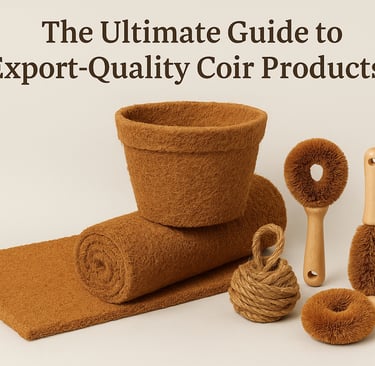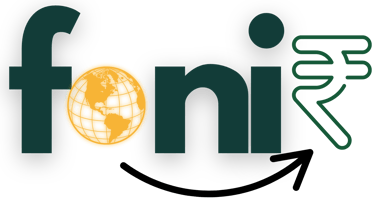The Ultimate Guide to Export-Quality Coir Products
7/31/20254 min read


Introduction to Coir Products
Coir products are derived from the fibrous husk of coconuts, a natural resource that is both plentiful and sustainable. This versatile material has garnered attention across various industries due to its myriad applications, which range from horticulture to home décor. Coir is produced through the processing of coconut husks, wherein the long and resilient fibres are extracted, cleaned, and converted into finished goods. The sustainability of coir as a resource is notable; it is biodegradable, meaning it can decompose naturally without contributing to environmental pollution.
The use of coir products offers multiple benefits, making them a preferred choice for eco-conscious consumers and industries. Firstly, coir is an effective alternative to synthetic materials, prominently utilized inRopes, mats, brushes, and erosion control products. These applications leverage coir's natural strength and durability while promoting sustainability. Furthermore, the water retention capabilities of coir make it particularly beneficial in agricultural sectors, helping to improve soil health and reduce the need for chemical fertilizers. As a result, coir-based products not only support environmental conservation but also foster sustainable agricultural practices.
In the export market, the significance of coir products cannot be overstated. As demand grows for environmentally friendly materials, manufacturers are increasingly recognizing the importance of quality in its production. High-quality coir products command a better price, thereby enhancing profitability for exporters. Quality assurance becomes crucial as it impacts consumer trust and the overall market perception of coir as a viable, sustainable choice. This alignment of quality with sustainability reflects a broader trend in global commerce, where ethical considerations are integral to business success.
Understanding Export Standards for Coir Products
Exporting coir products requires adherence to specific standards and certifications that ensure their quality and compliance with international regulations. In the realm of coir exports, key organizations such as the International Organization for Standardization (ISO) play a vital role in establishing quality benchmarks that manufacturers must meet. These standards not only enhance the product's marketability but also affect its pricing in global markets.
Coir products are subjected to various quality checks to assess their durability, biodegradability, and overall performance. For instance, factors like fiber strength, moisture content, and contamination levels are typically evaluated to confirm that the end products meet customer expectations and regulatory requirements. Meeting these quality checks ensures that coir products can compete effectively in international markets, where buyers have higher expectations for sustainability and quality.
Moreover, different countries may have their own specific regulations governing agricultural exports. These include phyto-sanitary certifications which guarantee that the coir products are free from pests and diseases. Compliance with such guidelines is crucial, as failing to adhere can result in denial of entry for products at borders, losses from rejected shipments, and potential damage to a company's reputation.
The implications of adhering to export standards extend beyond compliance; they also enhance the credibility of coir products in the global marketplace. The presence of recognized certifications can increase buyer trust, allowing manufacturers to position their coir products as premium offerings. Consequently, companies that prioritize alignment with these standards often see favorable pricing trends and greater demand in international markets.
Key Coir Products for Export
Coir products have gained significant popularity in international markets due to their eco-friendly nature and versatility. Among the various coir products, four stand out for their prominent export opportunities: coir fibers, coir mats, coir ropes, and coir pith. Each of these items possesses unique characteristics that appeal to different segments of the market.
Coir fibers are the coarse fibers extracted from the outer husk of coconuts. They are known for their durability and resistance to saltwater, making them ideal for use in products like fishing nets, bristle brushes, and soil erosion mats. Export buyers often seek fibers that are long, uniform, and free from dust and unwanted contaminants. High-quality coir fibers should have a low moisture content to ensure better durability and performance in end applications.
Coir mats, another vital product in the export sector, serve functional and aesthetic purposes. Typically made from coir fibers, they are used in gardening, home decor, and as anti-slip mats. Buyers look for mats that exhibit good density, uniform texture, and an ability to withstand varying weather conditions. Additionally, sustainable sourcing methods enhance the appeal of coir mats in the global market.
Coir ropes are prized for their strength and flexibility, making them suitable for agricultural applications and boat mooring. When exporting coir ropes, it is crucial to ensure they are free from visible defects and have a consistent thickness. Lightweight yet sturdy, they are favored in industries that value both functionality and environmental impact.
Lastly, coir pith, or coir dust, is a by-product of the fiber extraction process. It has excellent water retention properties and is widely used as a soil conditioner in agriculture and horticulture. Buyers in the export market often seek coir pith that is free from contaminants and has been properly processed to achieve a neutral pH balance for effective use in soil enhancement.
With a growing demand for sustainable products, producers must pay close attention to quality indicators and market preferences to successfully target specific coir products in the export arena.
Best Practices for Producing Export-Quality Coir Products
Producing export-quality coir products requires adherence to specific best practices that ensure the final offerings meet international standards. The initial step in this process is the sourcing of high-quality raw materials. Coir fibers are derived from coconut husks, and selecting coconuts that are matured is crucial. Mature coconuts yield stronger and longer fibers, which are preferable for manufacturing durable coir products. Additionally, establishing reliable relationships with local farmers for consistent supply helps maintain quality throughout production.
Following the acquisition of raw materials, the processing and manufacturing phase must be executed with precision. This typically involves several stages: retting, washing, and extracting the fibers from the husks. During retting, coir fibers are soaked in water, often under controlled conditions, to facilitate easier extraction and improve the fiber's quality. Implementing modern, efficient machinery along with skilled labor helps in achieving better fiber extraction with minimal damage, which is crucial in maintaining the integrity of the product.
Quality control measures cannot be overlooked in the production of export-quality coir products. Regular testing for strength, color, and consistency of fibers is essential. A dedicated quality assurance team should be responsible for monitoring these parameters throughout the production process. Additionally, adopting international quality standards such as ISO certifications can help to enhance credibility in the global market and assure buyers of the product quality.
Finally, sustainable practices should be central to the production process. Incorporating eco-friendly methods, such as organic fertilizers for coconut cultivation and using renewable energy during manufacturing, not only helps in maintaining ecological balance but also adds value to the coir products. Implementing these best practices will not only enhance the quality of coir products but also facilitate successful international trade.
Fonir Global Pvt. Ltd.
QUICK LINKS
© 2025. All rights reserved.


OUR PRODUCTS
